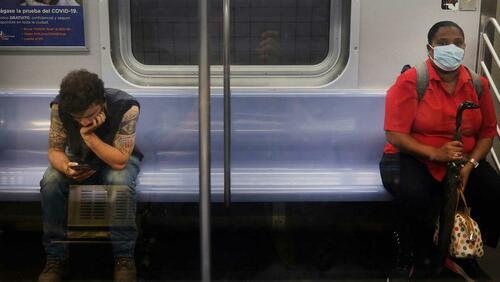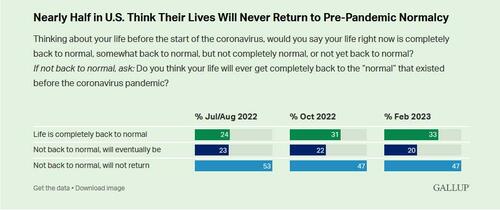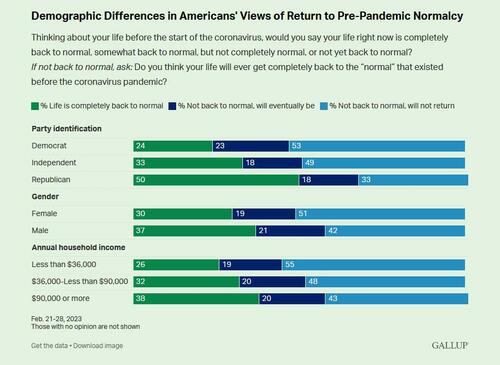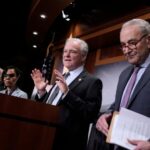
By Megan Brenan of Gallup,
Three years into the COVID-19 pandemic in the U.S., relatively few Americans, 33%, say their lives are completely back to normal, and those who say their lives have not yet completely returned to normal are largely pessimistic about it ever happening. Nearly half of U.S. adults, 47%, think pre-pandemic normalcy is not attainable for them, but 20% think their lives will eventually get back to normal.
These expectations have improved slightly since last summer, but they are essentially unchanged from Gallup’s previous reading in October.
The findings are from a Feb. 21-28 update to Gallup's probability-based COVID-19 web panel poll.
As with many attitudes related to the pandemic, Americans’ views diverge sharply and most significantly by partisanship. Just as Republicans are much more likely than Democrats to perceive the pandemic is over, they are also more likely to say their own lives are completely back to normal.
Half of Republicans say their lives are back to normal, and 18% say that their lives are not yet normal but will be eventually. That leaves 33% of Republicans who say their lives never will be back to normal. In contrast, 53% of Democrats believe their lives will never return to normal. Independents’ expectations are closer to Democrats’.
Perceptions of a return to normalcy in their own lives also differ significantly by gender and annual household income. Majorities of two typically Democratic-leaning groups -- women and lower-income adults -- say their lives will never be back to normal, while their counterparts are less likely to say as much.
Bottom Line
Three years after COVID-19 swept across the U.S., causing nationwide lockdowns, about half of Americans say the pandemic is over, just one-quarter are worried about contracting the disease, and more than six in 10 think the situation is improving. Social distancing behaviors have waned as U.S. adults increasingly report they have either been vaccinated against or infected with COVID-19.
Despite all of this, just one-third of Americans say their lives have returned to their pre-pandemic normalcy, nearly half report they are not back to normal and will never be, and 20% say life is not yet normal but will be eventually. The 47% who don’t foresee a return to normalcy may be getting used to a “new normal” that, for some, means occasional mask use, regular COVID-19 vaccines and avoidance of some situations that may put them at greater risk of infection, particularly at times when COVID-19 infections are spiking. The issue remains politically charged, with Republicans more likely to report a return to normal, while Democrats are more likely to say their lives will never be the same again.
By Megan Brenan of Gallup,
Three years into the COVID-19 pandemic in the U.S., relatively few Americans, 33%, say their lives are completely back to normal, and those who say their lives have not yet completely returned to normal are largely pessimistic about it ever happening. Nearly half of U.S. adults, 47%, think pre-pandemic normalcy is not attainable for them, but 20% think their lives will eventually get back to normal.
These expectations have improved slightly since last summer, but they are essentially unchanged from Gallup’s previous reading in October.
The findings are from a Feb. 21-28 update to Gallup’s probability-based COVID-19 web panel poll.
As with many attitudes related to the pandemic, Americans’ views diverge sharply and most significantly by partisanship. Just as Republicans are much more likely than Democrats to perceive the pandemic is over, they are also more likely to say their own lives are completely back to normal.
Half of Republicans say their lives are back to normal, and 18% say that their lives are not yet normal but will be eventually. That leaves 33% of Republicans who say their lives never will be back to normal. In contrast, 53% of Democrats believe their lives will never return to normal. Independents’ expectations are closer to Democrats’.
Perceptions of a return to normalcy in their own lives also differ significantly by gender and annual household income. Majorities of two typically Democratic-leaning groups — women and lower-income adults — say their lives will never be back to normal, while their counterparts are less likely to say as much.
Bottom Line
Three years after COVID-19 swept across the U.S., causing nationwide lockdowns, about half of Americans say the pandemic is over, just one-quarter are worried about contracting the disease, and more than six in 10 think the situation is improving. Social distancing behaviors have waned as U.S. adults increasingly report they have either been vaccinated against or infected with COVID-19.
Despite all of this, just one-third of Americans say their lives have returned to their pre-pandemic normalcy, nearly half report they are not back to normal and will never be, and 20% say life is not yet normal but will be eventually. The 47% who don’t foresee a return to normalcy may be getting used to a “new normal” that, for some, means occasional mask use, regular COVID-19 vaccines and avoidance of some situations that may put them at greater risk of infection, particularly at times when COVID-19 infections are spiking. The issue remains politically charged, with Republicans more likely to report a return to normal, while Democrats are more likely to say their lives will never be the same again.
Loading…









